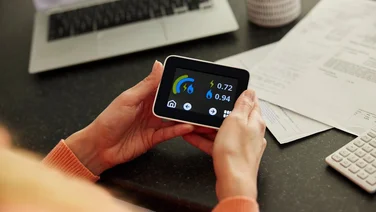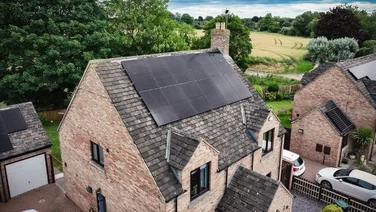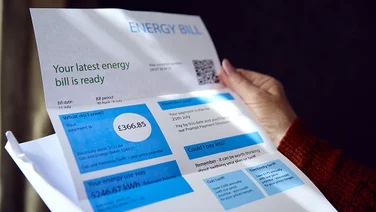- The scale of the climate emergency can feel overwhelming
- Many people around the world suffer from climate anxiety
- What can you do about it?
Climate change is serious. In fact, according to The Eco Experts’ 2024 National Home Energy Survey, 77% of consumers believe we’re in a climate emergency and feel anxious about the potential consequences.
This anxiety stems from changing weather conditions across the globe. An example of this is Texas – a typically hot state – experiencing snow and freezing temperatures whereby homes were frozen over.
Similarly, the latest analysis by The Met Office highlighted that even the UK is seeing, on average, more frequent periods of hot weather, bringing challenges for infrastructure, health and wellbeing.
All of this combined has created this climate anxiety, as it’s causing people to worry about the future of the planet.
Want to learn more about what this issue is and how it impacts people? Read on for the details.

What is climate change anxiety?
Mental health UK described climate anxiety as “a sense of fear, worry, or tension linked to climate change”.
It reported: “Young people stand to significantly and disproportionately shoulder the burden of climate change, however, making it more common in young people.”
Although the condition isn’t classed as a medical diagnosis yet, psychologists around the world have said more people are coming forward for therapy on climate change anxiety. Despite this issue clearly impacting people’s mental health, our National Home Energy Survey discovered a 4% year-on-year drop, from 81% in 2023 to 77% in 2024.
How many people suffer from climate change anxiety?
The exact number of people who suffer from climate change anxiety is unknown, but Gen Z continues to report the highest levels of anxiety about climate change, according to our 2024 National Home Energy Survey.
Our Survey also found that climate change remains the foremost environmental concern for the UK public, with 40% of more than 2,000 respondents expressing they are ‘very worried’ about the issue.
Dr Patrick Kennedy-Williams, a clinical psychologist from Oxford, treats common mental health issues including anxiety, depression, and trauma. He stated that over the past few years, there has been a high number of climate scientists and researchers beginning to approach him for help.
Eco-anxiety also seems to be widespread across the world. In the Global South, increasingly intense storms, wildfires, droughts, and heatwaves have impacted millions of people’s mental wellbeing – increasing climate anxiety, as well as PTSD.
“People in African countries experience eco-anxiety differently because climate change for us is about the impacts that we are already experiencing now and the possibilities of the situation getting worse.”
How is climate change impacting children?
As we’ve mentioned Gen Z are reported to have the highest anxiety around climate change, most likely because their future is unclear.
Our report also found that despite this, there was a slight shift towards reduced extreme anxiety among this group, likely due to a growing desensitisation or a sense of helplessness.
“Younger generations are more attuned to climate change urgency and feel its impact more intensely, whereas older generations tend to balance their understanding with immediate life concerns and personal experiences,” the Survey reported.
You can find this split using the table below:

Despite older generations introducing climate change (thanks to the ramping up of fossil fuels in the early 1900s), it seems young people have more guilt when it comes to their carbon emissions. For example, Savanta’s Eco Index 2021 found that nine out of 10 Gen Z people feel guilty about their carbon footprint – compared to seven out of 10 Baby Boomers.
On top of this, younger generations are more likely to have confidence that their actions will actually make a difference. Although this is a great motivator to make a change, it also puts a lot of pressure and stress on children.It’s also important to remember that despite children being the ones to deal with guilt about their emissions, the richest 1% of the world’s population is responsible for more than twice as much carbon pollution as the 3.1 billion people who make up the poorer half of humanity.
Savanta’s Eco Index 2021
Why does it matter?
Our recent National Home Energy Survey revealed that 51% of the 2000 UK adults we surveyed believed that we are currently experiencing a ‘climate emergency’, and 39% felt either ‘very anxious’ or ‘extremely anxious’ about climate change.
Climate change was the environmental issue that people were most worried about, followed by water and sewage pollution, air pollution, plastic pollution and and deforestation.
“We’re very worried about climate change, which is why we got involved in self builds, which utilise renewable energy”
When asked which aspects of climate change they were most concerned about, the most common answer was rising food prices and food insecurity (64%). Over the three years between May 2021 and May 2024 food prices in the UK have increased by 30.6%. This is more than they had previously risen in the previous 13 years, from January 2008 to May 2021.
Inflation, war in Ukraine, high fuel and energy costs, Brexit-related disruption and climate change have all contributed to this. The astonishing rise in the cost of olive oil, for example, can be directly attributed to climate change, with soaring temperatures and wildfires destroying crops across southern Europe.
Concerns about food security potentially reflect the broader economic and social disruptions experienced by UK consumers in recent years, demonstrating how climate change is increasingly interwoven with immediate economic realities.
National Home Energy Survey 2024
Read the full findings from this year’s report by downloading the PDF here
How will climate change anxiety change the way we live?
Climate anxiety is different for everyone, but we’re already starting to see a few key ways it’s changing day-to-day life.
Some people feel less inclined to have children
According to data from our 2024 National Home Energy Survey, climate change and the anxiety around this is causing almost half (43%) of Millenials to consider having fewer children.
The Survey also uncovered that 19% of Millenials had already decided to have fewer children, and these are also similar with Gen Z. Those born between 1997 and 2012 (25%) said they would be willing to have fewer children than they would otherwise like, and 36% said they would be willing to or have already done so.
Find out more by checking out The Eco Experts’ analysis.
“I’m very concerned about climate change and we have an awfully long way to go. Governments need to help more and make renewable energy tech more affordable because young people who want to invest in it can’t afford it. To lower climate change, things like funding and loans need to become more accessible.”
Some people are using their anxiety to motivate them to make a change
According to our survey, respondents were willing to do the following:
- Switching to an energy provider that only uses renewable energy was near the top of the list, with 22% saying they had already done so, and another 50% saying they would be willing to do so.
- The next most popular choice was a willingness to limit food to that produced in the UK, with 50% of people saying they were willing to join the 11% who said they were already sticking to UK-grown meals.
- Only walking, cycling and using public transport rather than driving was another popular step to take, with 30% saying that they were already doing this, and a further 24% saying that they would be willing to do so.
- Surprisingly 14% of respondents said that they were already having fewer children than they otherwise would, with another 15% saying that they would be willing to do so. Millennials were the most likely demographic to do this for environmental reasons, with 19% already making this choice and 24% considering it.
- Paying significantly more for meat and dairy products and flights were also quite strongly opposed. Overall, this reluctance underscores the challenges in aligning environmental concern with lifestyle changes that require significant personal sacrifice.
“We started to invest in renewable technology because we wanted to do something that would combat the enormity of the climate change issue. Climate change is a huge deal, even more so for our kids and it’s very frustrating. There seems to be so little international agreements and effort to actually do anything about it, which is a huge concern. But it’s been good to see the way that the energy transition has quickly gathered pace.”
Translating belief into action
Our data reveals conflicting perspectives among the public regarding personal responsibility for combating climate change. On one hand, there is general acceptance that small, personal efforts – whether using public transport, reducing energy consumption or adopting a plant-based diet can collectively make a difference.
However, the reality of translating this belief into action is less straightforward. For instance, while there is a growing willingness to invest in home energy efficiency – spurred on by rising energy costs – economic factors, such as the cost of living crisis, inflation and overall economic uncertainty significantly influence these decisions.
According to our survey, 84% of the public still hesitates to make significant lifestyle changes amid economic pressures. The financial burden of making homes more energy-efficient or living more sustainable lifestyles can be a deterrent, even for those committed to environmental causes.
As people grapple with immediate financial pressures, the willingness to adopt potentially costly or inconvenient lifestyle changes diminishes. This is especially true when the benefits of such changes are not immediately visible or directly felt.
What information do people want?
When asked about the type of information about climate change they are most interested in, the biggest demand (16%) is for actionable, practical tips for individuals to implement to reduce their carbon footprint. This reflects a desire to take action to contribute to climate mitigation.
More concerningly, 12.4% of people say they were not interested in information about climate change at all, whereas 12.2% said they were overwhelmed by the current amount of information about climate change.
This adds to the mixed picture seen elsewhere in this report, where people recognise the importance of climate change, but they feel somewhat powerless to do anything about it.
How can you reduce your climate change anxiety?
Dealing with climate anxiety can be tough. Not only are you worried about something that is a real threat to you, but it’s also difficult to avoid hearing about it all the time.
If you’re suffering from eco-anxiety, there are a few key things you can do, including:
- Confronting your feelings – Thoughts on climate change can be complex and intense, but by recognising your feelings, can you begin to address them. This can be very difficult for some people, since it usually involves confronting your own mortality, but it’s a great first step
- Talking about it – Whether it’s with a friend, a member of your family, or a professional, talking about your feelings can help you deal with anxiety. This is key with all mental health issues, but it can especially help you wrap your head around something as mammoth as climate change, and can help you find reassurance
- Getting involved in volunteering – Lack of control over climate change can often lead people into a spiral of worrisome thoughts. One key way to overcome this is to get out there and get involved in some environmental volunteering. This way, you can be a part of nature’s recovery, and help your mental health at the same time
- Connecting with like-minded people – Remember that you’re not alone in this. Whether you find an online community that focuses on climate anxiety, or you know people around you that also suffer from it, get talking and share your feelings
- Connecting with nature – Studies have shown that a simple walk in nature can reduce anxiety. One study in particular found that people were more likely to experience meditative-like brain waves when walking in a green space, compared to busy city areas. Plus, this could tie in nicely with our earlier point of getting stuck in with environmental volunteering
Summary
- According to The Eco Experts’ 2024 National Home Energy Survey, 77% of consumers believe we’re in a climate emergency and feel anxious about it
- The latest analysis by The Met Office highlighted that even the UK is seeing, on average, more frequent periods of hot weather
- Mental health UK described climate anxiety as “a sense of fear, worry, or tension linked to climate change”
- Psychologists around the world have said more people are coming forward for therapy on climate change anxiety
- Gen Z are reported to have the highest anxiety around climate change, most likely because their future is unclear
- Climate change remains the foremost environmental concern for the UK public
- Climate change and the anxiety around this is causing almost half (43%) of Millenials to consider having fewer children.







